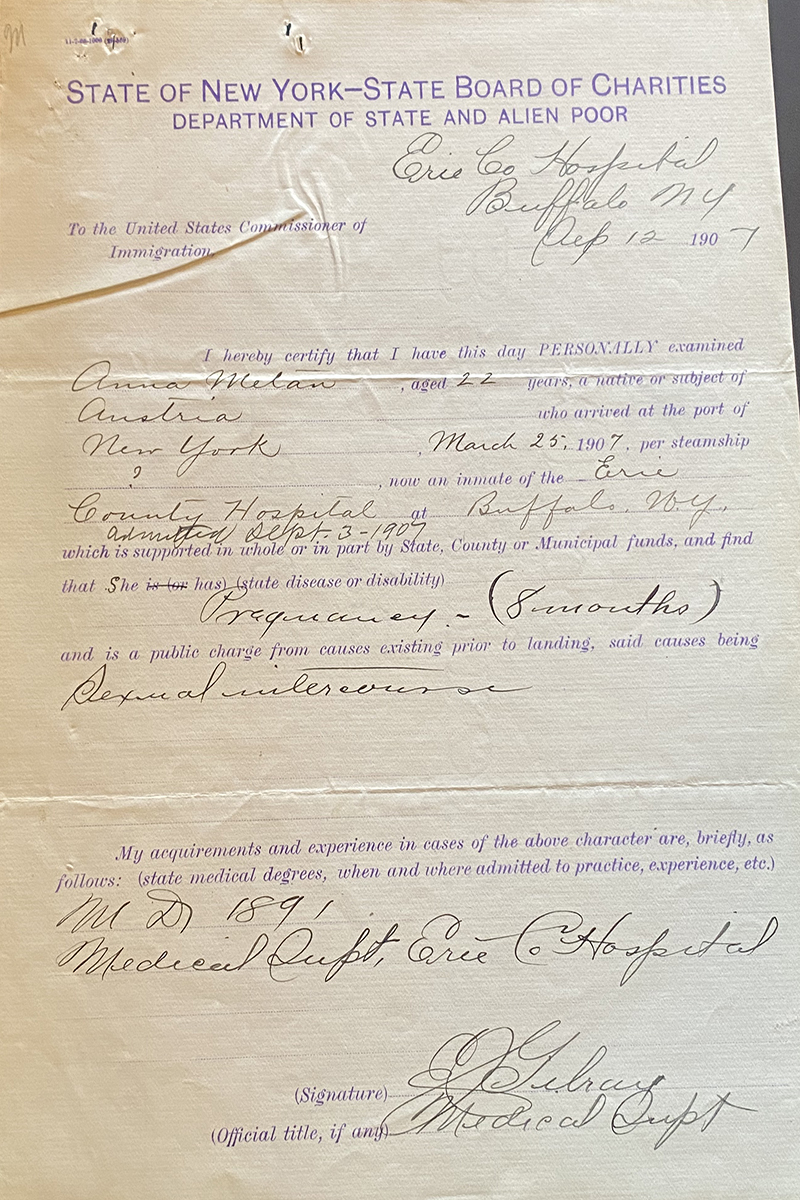
History Fellow Mines Immigration Records for Forthcoming Book Chapter
By Angela Tudico | National Archives News
WASHINGTON, June 30, 2023 — Dr. Randa Tawil, one of two 2022 Cokie Roberts Women’s History Fellows, spent November 2022 here at the National Archives, researching Immigration and Naturalization Service (INS) case files to explore the correlation between pregnancy and deportation for early 20th-century migrants to the United States.
To answer questions about mobility, gender, sexuality, immigration, and hardening border restrictions in the early 1900s, Tawil looked at how INS officials worked with doctors to enforce public charge laws against single pregnant women months after their arrival to the United States.
“I had never heard of women being deported so late in their pregnancy and for this reason,” Tawil explained. “These women were not visibly pregnant when they arrived in the U.S. and subsequently sought medical care in hospitals for their pregnancies, and the government used that moment, simultaneously with the latest advances in the field of obstetrics, to decide when a woman became pregnant in order to enforce immigration restrictions. That was an interesting timeline that I wanted to delve into.”
Her findings will appear in the forthcoming chapter, “Time Difference: Pregnancy and Deportability in Early 20th Century United States,” that will be published in late 2024 in the anthology, “The Hidden Histories of Unauthorized European Immigration in the United States,” edited by Deborah Kang and Danielle Battisti.
Tawil was already familiar with the National Archives and the INS case files prior to this project and was researching her book in progress, “Race in Transit: Mobilities Between Greater Syria and North America,” when she found a case file for a single pregnant European woman that did not fit with her research on Syrian migration, but which she said she felt compelled to pursue.
Tawil credits the fellowship for affording her the time and a community of support required to reveal the experiences of these female migrants, albeit filtered through the official government reporting available in the files.
“These are government records so they appear complete and correct, but they don’t tell the full story of these women, and we’re never going to know that story fully–that’s history,” Tawil said. “But some recovery and meditation on these glimpses into the past and making these marginalized people actually be the agents of history is something that’s important.”
Tawil is an assistant professor of Women and Gender Studies at Texas Christian University. She earned her doctorate from Yale University and her bachelor’s degree from Wesleyan University, both in American Studies.
She is conducting her research as a 2022 recipient of the Cokie Roberts Women’s History Fellowship. Supported by the National Archives Foundation, the fellowships are awarded to early to mid-career historians, journalists, authors, or graduate students who perform and publish new research to elevate women’s history using records held by the National Archives.
“This fellowship is a testament to Cokie Roberts’ prescience,” Tawil noted. “This history is important, and it might take more support to write it. But ultimately it’s producing some of the most interesting work out there.”
The fellowship launched in 2019 to honor noted author and journalist Cokie Roberts, who spent her career shining light on the stories of many women who had an impact on U.S. history.
“Cokie was a leader on our board and a lifelong advocate for the Archives,” said Jim Blanchard, President and Chair of the National Archives Foundation Board of Directors and former Michigan governor. “These fellowships are a wonderful tribute to her ongoing inspiration to the field of women’s history.”

